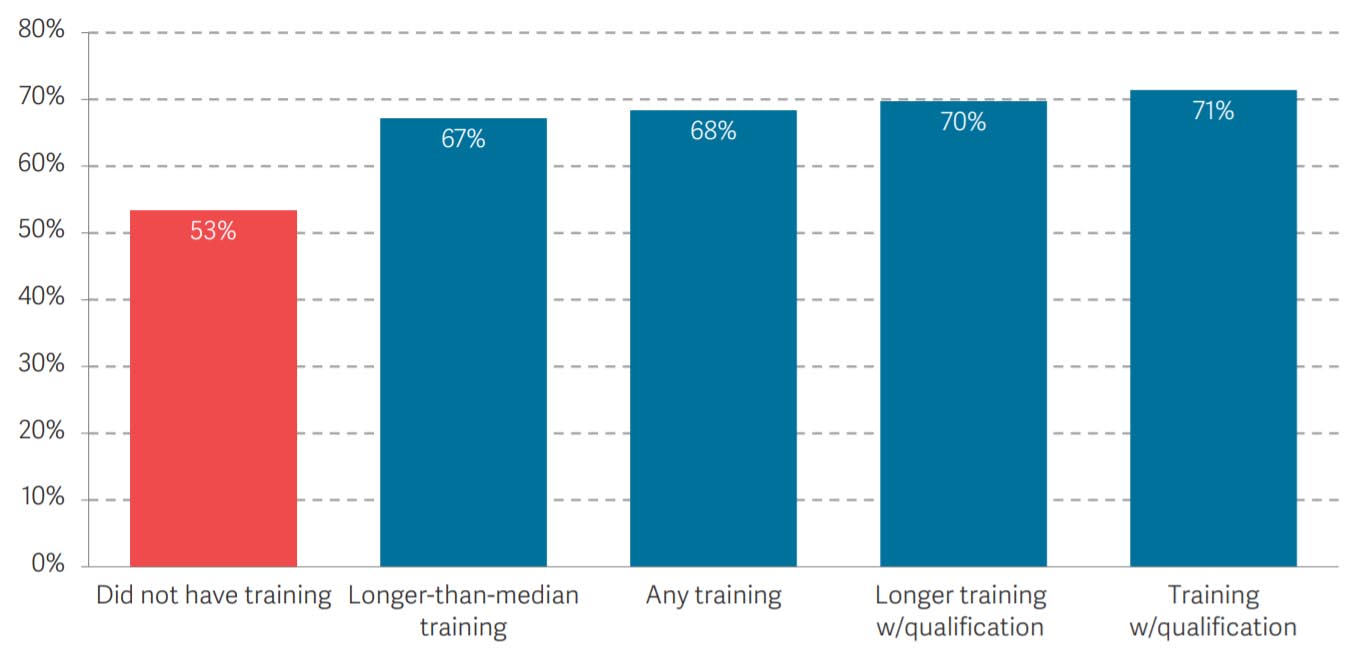Rethinking Adult Training and Retraining

#Post16RevolutionaryReforms – In the run-up to the current crisis, nearly one-in-five UK workers were in a sector that would be temporarily shut, a large proportion of whom were low-paid and had lower-level qualifications.
It’s unclear how many of these have come back to work (as of early August four-in-ten workers in hospitality and leisure remained furloughed).
The number that could lose their jobs permanently next month, when the furlough scheme draws to a close is even less clear still.
Participation Benefits
But no matter how, and when, job losses occur, it’s safe to say that policymakers will look adult education and training as a way to help unemployed adults find their way back into work.
There is some good news on this front: research recently published by the Resolution Foundation finds that even after controlling for several personal and work-related factors, adult education and training can make a substantive difference to the odds of a person who has moved out of work being able to move back into it within two years (see Table 1).
Table 1: Selected predictive proportions of 25-59-year-olds returning to stable work, by type of training and subgroup: UK, 2012-18
No training |
Any training |
Longer than-median training |
Training w/ qualification |
Training w/ qualification |
|
| All | 53% | 68% | 67% | 71% | 70% |
| High-level qualifications | 68% | 82% | |||
| Mid-level qualifications | 55% | 74% | 76% | 78% | 78% |
| Lower-level qualifications | 47% | 56% | 65% | 63% | |
| 25-44 women, non-graduate | 39% | 55% | 62% | ||
| 45-59 men, non-graduate | 55% | 85% | 85% | ||
| 25-44 men, graduate | 55% | 96% | |||
| 25-44 women, graduate | 52% | 78% | |||
| 45-59 men, graduate | 66% | 97% |
In fact, the effects are largest for non-graduates and in particular non-graduate women. Without any training, we would expect 39% of 25-44-year old non-graduate women who had recently moved out of work to return with two years, as compared against 62% of those who had undertaken training resulting in a qualification.
Participation Barriers
Unfortunately, this same group of adults are less likely to access education and training: figures from Understanding Society, a longitudinal survey, show that while more than one-in-three (35%) of 25-59-year old graduates report having had any form of training or education outside of full-time study, only about one-in-five 25-59-year-olds with GCSE-equivalent or lower qualifications report the same. There’s a laundry list of reasons for this, but we’d be safe in assuming that two stand out: time and money.
Most non-employer-provided courses (outside of statutory English and Maths) incur fees, which can put off risk-averse adults who have no way of knowing whether study will indeed pay off. Then there’s time: finding the time to study on top of family responsibilities, working and/or looking for work is difficult.
Earning before Learning
It can be even more difficult for those on flexible or zero-hours contracts (ZHCs) – who could be forced to make a choice between earning and learning at short notice. The proportion of workers on ZHCs rose sharply in the wake of the financial crisis, and there’s little to suggest that won’t be on the cards this time around – particularly in hard-hit sectors like hospitality.
Career Change Challenges
That brings us onto career changes: given the sectoral impacts of this crisis, some adults will want–or need–to change the sector in which they work, and hopefully change sector while obtaining a pay boost. This is a difficult task: we find that although most forms of education are significantly linked to ‘positive career changes’ (i.e. changing job and receiving a 10% rise in monthly pay), only full-time education appears to have a particularly large effect.
While we would expect just 5% of workers who have not experienced training to have both changed industry and received a minimum 10% pay rise compared to three years ago, our findings indicate that 11% of those who had completed some full-time education in the interim would have done so.
Results for other forms of education are smaller (see Table 2).
Table 2: Predictive proportion of 25-59-year-olds returning to stable work after having workless spell, by type of training: UK, 2012-18

We shouldn’t infer from these findings that shorter or part-time courses are unlikely to help a person make a positive career change. Instead, we should see these findings as a reflection of just how difficult each stage of the career change process is.
For instance, understanding how a person’s skills translate into a new field, how they should set about finding a new role, and whether that move will financially pay off.
Even then, there’s the question of training for it:can they afford to balance study, work, and family responsibilities – let alone the nerves that can come with re-entering the classroom after a long time away.
Three Reforms for the White Paper
- First, policymakers should of course look to learning as one way to tackle the high levels of unemployment coming down the track. Even despite a difficult job market, there is strong evidence to suggest that training can play a substantial role in helping lower-qualified workers re-enter a job after a spell of worklessness.
- Second, over the short-to-medium term, government should consider policies that would help adults re-enter work and/or change career by adopting more sector-focused job creation initiatives that have training built into them – green jobs like retrofitting and social care could be good candidates.
- And third, policymakers should develop plans to help adults retrain over the longer- term. Allowing adults to access maintenance support while studying in further education, allowing student finance on a modular basis so that learners build up credits over time, and removing ‘equivalent or lower qualification’ restrictions would make a world of difference.
There’s no panacea – policy will have to fire on all fronts.
Kathleen Henehan, Senior Research and Policy Analyst at the Resolution Foundation
‘Revolutionary Forces’In the immediate aftermath of the Covid-19 pandemic, it is easy to forget that there were wider revolutionary forces at work on the UK’s economy before the virus outbreak. Issues such as Brexit, the rise of automation in the workplace, longer working lives, and poor UK productivity have brought into even sharper focus, education and skills. NCFE and Campaign for Learning (CfL), published the first in the series of ‘Revolutionary Forces’ discussion papers on 6 July 2020. In this Revolutionary Forces series different perspectives and proposed reforms for the post-16 education and training system have been brought together in one pamphlet, from expert stakeholders, think-tanks and educational professionals. Building on the recommendations outlined in the first paper for flexible reforms that support economic and social renewal, this new paper, “Reforms for a Revolutionary Post-16 White Paper“, takes a deeper look at which areas need to be addressed. The authors are:
|











Responses